2013年春外研英语七年级下册单元测试题(Module 11)
七年级下册(外研版)英语单元检测卷附答案:Module 11 Body language
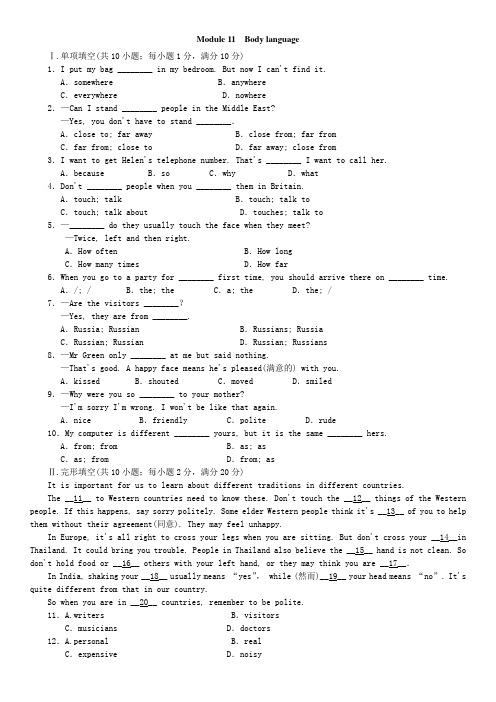
Module 11Body languageⅠ.单项填空(共10小题;每小题1分,满分10分)1.I put my bag ________ in my bedroom. But now I can't find it.A.somewhere B.anywhereC.everywhere D.nowhere2.—Can I stand ________ people in the Middle East?—Yes, you don't have to stand ________.A.close to; far away B.close from; far fromC.far from; close to D.far away; close from3.I want to get Helen's telephone number. That's ________ I want to call her.A.because B.so C.why D.what4.Don't ________ people when you ________ them in Britain.A.touch; talk B.touch; talk toC.touch; talk about D.touches; talk to5.—________ do they usually touch the face when they meet?—Twice, left and then right.A.How often B.How longC.How many times D.How far6.When you go to a party for ________ first time, you should arrive there on ________ time.A./; / B.the; the C.a; the D.the; /7.—Are the visitors ________?—Yes, they are from ________.A.Russia; Russian B.Russians; RussiaC.Russian; Russian D.Russian; Russians8.—Mr Green only ________ at me but said nothing.—That's good. A happy face means he's pleased(满意的) with you.A.kissed B.shouted C.moved D.smiled9.—Why were you so ________ to your mother?—I'm sorry I'm wrong. I won't be like that again.A.nice B.friendly C.polite D.rude10.My computer is different ________ yours, but it is the same ________ hers.A.from; from B.as; asC.as; from D.from; asⅡ.完形填空(共10小题;每小题2分,满分20分)It is important for us to learn about different traditions in different countries.The __11__ to Western countries need to know these. Don't touch the __12__ things of the Western people. If this happens, say sorry politely. Some elder Western people think it's __13__ of you to help them without their agreement(同意). They may feel unhappy.In Europe, it's all right to cross your legs when you are sitting. But don't cross your __14__in Thailand. It could bring you trouble. People in Thailand also believe the __15__ hand is not clean. So don't hold food or __16__ others with your left hand, or they may think you are __17__.In India, shaking your __18__ usually means “yes”, while (然而)__19__ your head means “no”. It's quite different from that in our country.So when you are in __20__ countries, remember to be polite.11.A.writers B.visitorsC.musicians D.doctors12.A.personal B.realC.expensive D.noisy13.A.polite B.easy C.rude D.friendly14.A.mouth B.hands C.legs D.knees15.A.right B.left C.first D.second16.A.touch B.draw C.send D.receive17.A.happy B.sadC.successful D.impolite18.A.hand B.head C.foot D.nose19.A.nodding B.shaking C.waving D.moving20.A.big B.foreign C.beautiful D.richⅢ.阅读理解(共5小题;每小题3分,满分15分)The meaning of shaking one's head is not always the same in different countries. Maybe some visitors would be surprised when they first come to India. Indians always shake their heads when they talk to others. But it does not have the same meaning as our “No”. If someone wants to visit India, he should know this, or it will bring him some trouble.One day, a foreign officer went to India on business. He hired(雇用) an Indian to drive his car. When he told the driver to send him to his office, the Indian shook his head at once. The officer said again, but the driver shook his head again. At last, the officer, of course, got angry.“How dare(敢) you refuse(拒绝) my order?” he shouted, “Drive me to my office at once!”The driver answered in quite a loud voice, “Yes, sir!” But to the officer's surprise, the driver shook his head at the same time.The car started, and the foreign officer was too surprised to say a word. He thought about it for a while, and then he nodded with a smile, “‘No’__means__‘Yes’__here!”21.The passage mainly tells us about the________ in India.A.body language B.clothesC.trouble D.festival22.An Indian will shake his head when he________.A.gets angry B.agrees with othersC.waits for others D.gets tired23.The foreign officer was surprised that the driver________.A.shook his head as he said “Yes”B.couldn't understand himC.refused his orderD.shouted loudly24.The underlined sentence “‘No’means ‘Yes’ here!” shows________.A.in India the words “Yes” and “No” have the same meaningB.Indians don't say “No” when they disagree with othersC.we shake our heads to say “No” while Indians do so to mean “Yes”D.Indians don't usually use the word “Yes” as much as “No”25.Which of the following is NOT true according to the passage?A.The driver didn't want to take the officer to his office.B.In China, shaking one's head means “No”.C.Shaking the head doesn't always have the same meaning in different countries.D.When an Indian shakes his head, he really means “Yes”.Ⅳ. 任务型阅读(共5小题;每小题3分,满分15分)Americans like to look at the other person in the eyes when they are talking. If you don't do so, it means you are unhappy, or you are not interested.For Americans, thumbsup means yes, very good or well done. Thumbsdown means the opposite(相反). To call a waiter, people put one hand above the head. It is all right to point at things but not at people with the hand and index finger(食指). Americans shake their index finger at children when they scold(责备) them and touch them on the head when they admire(夸奖) them.Learning body language is sometimes difficult. If you don't know what to do, the best thing to do is to smile.根据短文内容,判断正(T)误(F)。
七年级英语外研版下册模块综合检测题(Module11_National_heroes)附答案
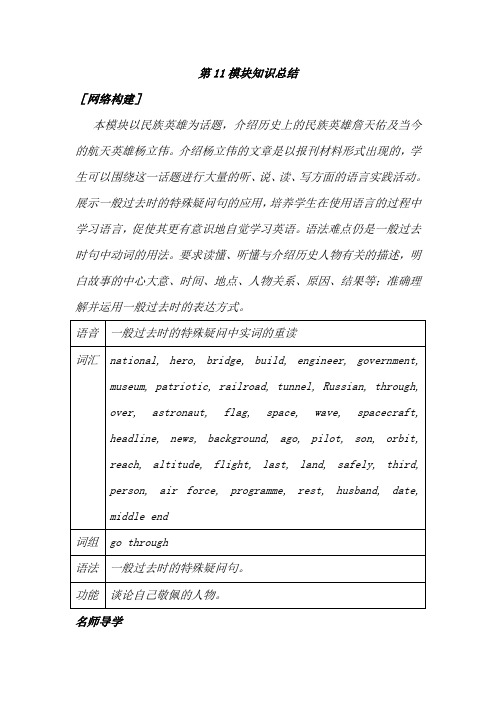
第11模块知识总结[网络构建]本模块以民族英雄为话题,介绍历史上的民族英雄詹天佑及当今的航天英雄杨立伟。
介绍杨立伟的文章是以报刊材料形式出现的,学生可以围绕这一话题进行大量的听、说、读、写方面的语言实践活动。
展示一般过去时的特殊疑问句的应用,培养学生在使用语言的过程中学习语言,促使其更有意识地自觉学习英语。
语法难点仍是一般过去时句中动词的用法。
要求读懂、听懂与介绍历史人物有关的描述,明白故事的中心大意、时间、地点、人物关系、原因、结果等;准确理解并运用一般过去时的表达方式。
名师导学典例分析例补全对话。
A: Hey, Sally! I didn’t see you last w 1 . What did you do?B: I s 2 at home.A: Why?B: I h 3 lots of things to do. I c 4 my room then I d 5 my homework. What about you?A: Oh s 6 afternoon I played soccer. On Sunday morning I went to a movie. And on Sunday n 7 I v 8 my friends. B: Wow, you had f 9 .A: Yes. But I d 10 do my homework, so this morning I was bad.思维分析:本题考查一般过去时的用法。
注意谈论过去发生的事情,时态应该用一般过去时。
答案:1. weekend 2. stayed 3. had 4. cleaned 5. did 6. Saturday 7. night 8. visited 9. fun 10. didn’t规律总结方法点拨:补全对话解题思路1.问答呼应。
日常交际用语要遵循“问什么答什么,答什么问什么”的原则。
2.前后一致。
要做到话语前后一致,避免前后矛盾。
(外研版)初中英语七年级下册Unit 11测试题(有答案解析)

一、选择题1.What did you ________ yesterday?A.buy B.bought C.buys D.buying 2.—Did Molly go to the library yesterday?—_______.A.Yes, she was B.Yes, she is C.Yes, she does D.Yes, she did 3.—Lin Dan is my favorite sports star. I met him last weekend.—_______.A.Yes, please B.I see C.Lucky you D.You’re right 4.Jane got up late ______ she didn’t miss the early bus.A.Then B.Also C.Quickly D.Luckily 5.It is difficult for us ________ a cow though it looks easy for my grandpa.A.to milking B.milks C.milked D.to milk 6.Did you find a boy ________in the corner?A.to cry B.crying C.cried D.cries 7.—Who went to the cinema with Becky? —Grace_________.A.went B.goes C.did D.didn’t 8.---- _______he go to Central Park ? -----Yes, he did.A.Did B.Do C.Does D.Is 9.Mary likes drawing very much. Her _______ are very good.A.books B.songs C.photos D.paintings 10.Alice showed her new friends ____ her school yesterday afternoon.A.of B.to C.around D.at 11.(题文)Yesterday, we ______ to the park and _____ a good time there. A.go; have B.went; have C.went; had D.goes; had12.(题文)What about going _________ with us?A.fish B.fishes C.fished D.fishing13.The girl enjoys the radio very much.A.listening B.to listen C.listening to D.to listen to 14.—Thanks for asking me. —_____________.A.No, thanks B.You’re welcome C.The same to you D.Yes, please 15.He to the zoo yesterday.A.goes B.go C.goed D.went 16.Lin Ling ______ with his cousin last Sunday.A.rides a horse B.pick applesC.took a walk D.is watering flowers17.Let Nancy ______ her father.He will be back in two hours.A.not to worry about B.not worry aboutC.be not worried about D.not to be worried about18.—Who cooked the lunch today? — I _______.A.did B.does C.was D.do19.We went to the Great Wall ______ vacation.A.at B.on C.for D.to20.difficult for us take good photos.A.It’s; to B.It’s; for C.It; to D.It was; for【参考答案】***试卷处理标记,请不要删除一、选择题1.A解析:A【详解】句意:你昨天买啥了?考查动词用法。
外研七下Module 11单元测试题及答案
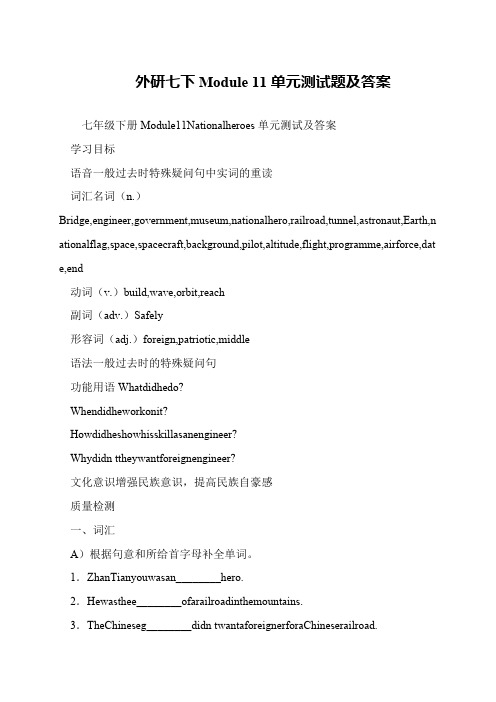
外研版七年级下册英语练习Module 11 单元测试题
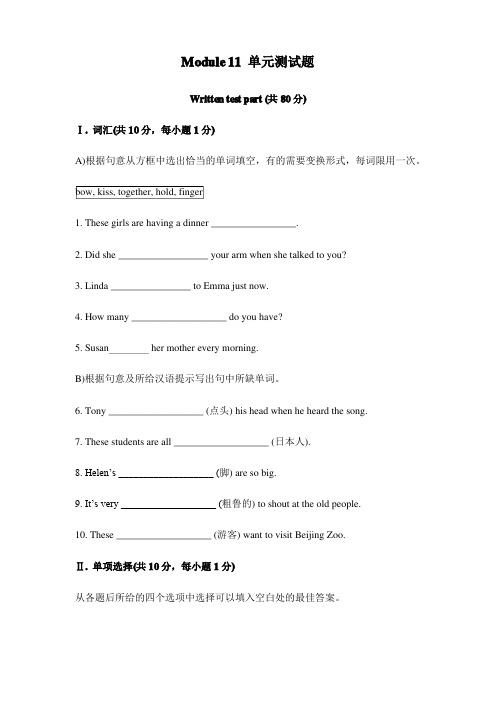
Module 11单元测试题Written test part (共80分)Ⅰ.词汇(共10分,每小题1分)A)根据句意从方框中选出恰当的单词填空,有的需要变换形式,每词限用一次。
bow, kiss, together, hold, finger1. These girls are having a dinner _________________.2. Did she __________________ your arm when she talked to you?3. Linda ________________ to Emma just now.4. How many ___________________ do you have?5. Susan her mother every morning.B)根据句意及所给汉语提示写出句中所缺单词。
6. Tony ___________________ (点头) his head when he heard the song.7. These students are all ___________________ (日本人).8. Helen’s ___________________ (脚) are so big.9. It’s very ___________________ (粗鲁的) to shout at the old people.10. These ___________________ (游客) want to visit Beijing Zoo.Ⅱ.单项选择(共10分,每小题1分)从各题后所给的四个选项中选择可以填入空白处的最佳答案。
()11. Mary is going to visit some places around ___________________world.A. anB.不填C. theD. aBetty.()12. You can’t stand too close ___________________A. forB. withC. atD. to()13. Helen is ___________________and kind. All of us like her.A. politeB. strangeC. excitedD. tired()14. They come from ___________________towns, but they can speak ___________________language.A. the different; the sameB. the different; sameC. different; the sameD. different; same()15. We eat with our ___________________ .A. eyesB. mouthsC. legsD. knees ()16. Simon is looking at ___________________ .A. other somewhereB. somewhere otherC. else somewhereD. somewhere else()17.—How about ___________________the books?—That’s a good idea.A. putting awayB. put awayC. to put awayD. puts away()18. ___________________swim here, children. It’s too dangerous.A. NotB. NoC. Don’tD. Doesn’t()19. ___________________quick, please! It’s time for class.A. BeB. AmC. IsD. Are()20.—What do you say when you meet your teacher in the afternoon?— _____________.A. Good morningB. Good afternoonC. GoodbyeD. Thank youⅢ.完形填空(共10分,每小题1分)先通读下面的短文,掌握其大意,然后从A、B、C、D四个选项中选出可以填入空白处的最佳答案。
初中英语外研版七年级下册Module11 Body language单元练习含参考答案
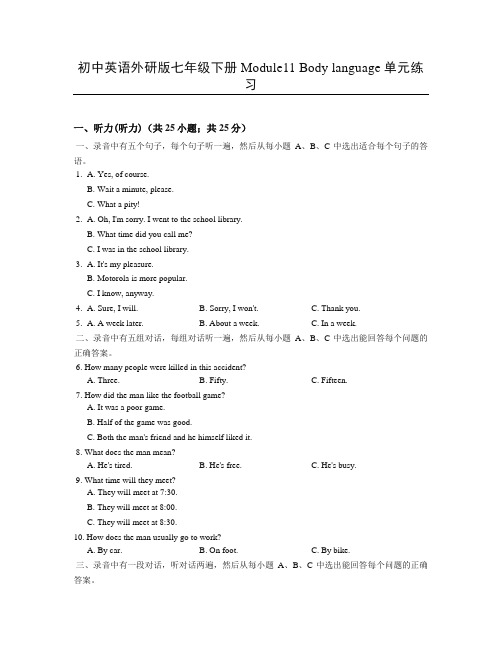
初中英语外研版七年级下册Module11 Body language单元练习一、听力(听力)(共25小题;共25分)一、录音中有五个句子,每个句子听一遍,然后从每小题A、B、C中选出适合每个句子的答语。
1. A. Yes, of course.B. Wait a minute, please.C. What a pity!2. A. Oh, I'm sorry. I went to the school library.B. What time did you call me?C. I was in the school library.3. A. It's my pleasure.B. Motorola is more popular.C. I know, anyway.4. A. Sure, I will. B. Sorry, I won't. C. Thank you.5. A. A week later. B. About a week. C. In a week.二、录音中有五组对话,每组对话听一遍,然后从每小题A、B、C中选出能回答每个问题的正确答案。
6. How many people were killed in this accident?A. Three.B. Fifty.C. Fifteen.7. How did the man like the football game?A. It was a poor game.B. Half of the game was good.C. Both the man's friend and he himself liked it.8. What does the man mean?A. He's tired.B. He's free.C. He's busy.9. What time will they meet?A. They will meet at 7:30.B. They will meet at 8:00.C. They will meet at 8:30.10. How does the man usually go to work?A. By car.B. On foot.C. By bike.三、录音中有一段对话,听对话两遍,然后从每小题A、B、C中选出能回答每个问题的正确答案。
外研版七年级英语下册Module11单元练习题

外研版英语七年级下Module 11 单元测试题第Ⅰ卷(共75 分)一、单项选择:选择最正确答案(重点难点全在这,看你的本领了)(35分)() 1. Mike is from _____ , and he speaks _____.A. French, FrenchB. France, France.C. French,France.D. France,French.( ) 2. Can you ______ your sister to my party this evening ? I like her very much.A.giveB. bringC.wantD.take.() 3. My sister wants to go _______ this summer .A. somewhere coolB. cool somewhereC. anywhere coolD. cool anywhere( ) 4. Please ________ the door . It is too cold outside .A.don't openB. doesn't openC. openD. don't close.() 5. All my classmates like the new film, but I don't like it _______ .A. after all.B. at leastC. eitherD. at all.( ) 6. _______ this kind of peach and you will like it.A. To try.B. TryingC. TryD. Tries .( ) 7. The Smiths together with Mr. Wang ________ in that factory .A.work,.B.works,C. workingD.is working .() 8. I thought Betty was in the garden ,but __________she was in her room.A. in fact.B. in needC. in dangerD. in time.() 9. Jack , can you help me ______ the chair to the other side ?A. nodB.moveC.touchD. wave.( ) 10.—Don't be late again , Mike .---- ________.A. No , I don't.B. Don 't worry.C. Sorry , I won't.D. I don't know.() 11. ________Alan have a party last week?A. WasB. WereC. DoD. Did( ) 12.-When did you go there?- Three days_________ .A. lastB. agoC. nowD.after() 13.— What do you think of the book ?— _________ .A. It is about China.B. Very much.C. It is very interesting.D. It is 5 yuan .() 14. ---Did you ________ school on time ? ---No , we didn't.A. reachB.arriveC. getD.get in() 15.I am very tired now,, let 's sit down and have a.A.restB. dreamC. journeyD. question.() 16. The railway road goes______ the mountains.A.overB. underC. throughD.across.() 17. There is a bridge_______ the wide river .A. over.B.underC.acrossD. through.()18. My house is________the train station. It is only ten minutes on foot.A.close toB. far fromC. near at.D.close with.() 19. There is_____space for a big bed in the room . The room is too small .A. littleB. manyC. muchD. few.() 20.— Thank you for your present .— ________ .A. It doesn't matter.B. Not at all.C. That's OK.D. The same to you.() 21. The girl started school the age of 6 .A. about.B. toC. onD. at() 22. I know a boy ________Li Lei.A. callingB. to callC. calledD. calls() 23. China is famous ________the Great Wall.A. for.B. in.C. at.D. of.() 24. Mr. Smith came to China_________ his wife last year.A.andB.butC. withD. for() 25. Yang Liwei rested in the spacecraft two hours.A. forB. inC. atD. on.() 26.Betty with her parents _________ for a walk every day.A. goB. wentC. goesD.is going.() 27.When I was a small child, I enjoyed my mother’s fairy tales.A. listening toB. hearingC. listeningD. to listen to() 28.Jack will __________London in three hours.A. arrive atB. getC. reachD. reach to.() 29.Did you enjoy ________ at the beach last weekend?A. yourB.youC. yoursD. yourself.() 30.We have PE class Monday and Friday.A. fromB. inC. atD.on() 31.You can go to the small island _______ .A. by boat.B. on boatC. by the boatD. by a boat.() 32.My parents_______ nice presents for me on my last birthday.A. sawB. boughtC. tookD. visited() 33.Please say hello ________ your parents when you get home after school.A.toB. forC. atD. in() 34.He does not have much money,he lives a happy life .A. soB.butC. becauseD.or.() 35.It takes me three hours________ to the cinema.A.gettingB. to get.C. getD. got.二.完形填空( 10分)Long long ago there was a poor man . He had an apple tree in his garden.On thetree there there were many fine apples.One day he36one of his apples was much bigger than the others . Itwas as big as a football(和足球相同大)。
外研版七年级下册英语 Module 11单元测试卷(含答案)

外研版七年级下册英语Module 11单元测试卷(满分100)一、单项选择(每小题1分,共15分)1.—Let's go to the movies after the test.—________A.Not at all. B.Never mind.C.It doesn't matter. D.Good idea.2.The visitors are from foreign countries.They're ________.A.Russia B.EnglishmanC.France D.Japanese3.Many people think it's very important ________ us ________ learn English well.A.for;to B.to;to C.with;for D.of;for4.—I'm sorry I ________ my exercise book at home this morning.—It doesn't matter. Don't forget ________ it here this afternoon.A.left; to take B.forgot; bringingC.left; to bring D.forgot; to bring5.________ people touch noses when they meet.A.Russian B.German C.Maori D.British6.“No smoking” was mentioned as a local policy by Beijing government on June 1st, 2015.Which picture below can describe the theme?A B. C.7.—Where would you like to visit?—I'd like to go________.A.relaxing somewhere B.somewhere relaxingC.relaxing anywhere8.________ so busy every day.Learn to enjoy your life!A.Not B.Not be C.Don't D.Don't be9.—What do they do when they meet?—________A.They're workers.B.They come from China.C.They often shake hands.D.They are fine.10.Mr Lee is leaving.Let's go and ________ “goodbye” to him.A.speak B.say C.talk D.tell11.—Give my best wishes to your uncle.—________.A.No, I don't B.OK, I willC.Yes, I do D.Yes, I would12.Don't stand too ________ to North Americans!A.to close B.closedC.close D.closing13.I think it's________to say nothing if someone helps you.A.kind B.rude C.clear D.polite14.It's difficult for me ________ English. Please give me some advice.A.learn B.learning C.to learn D.learns15.In fact,I don't like the song ________.A.in all B.for all C.at all D.after all二、完形填空(每小题1分,共10分)Body language is very important.It can make others understand(理解)you easily.When you are talking with others,you are ________only using words,but also using body language.In China,waving your ________ is to say “goodbye”.Smiling and clapping hands(拍手)mean “________”. Nodding the head means “yes”,and shaking the head means “no”.Different countries have different body language.People in Russia kiss ________ other when they meet,but people in China shake ________.People in some countries like touching each other,but many people in Britain don't like others to touch them ________all.People in the Middle East like standing close to others when they are talking,but you have to give people from North America more ________space when you're talking with them.In some Asian countries,it's not polite ________the head of others.People from other countries may not understand your language, _______hey may understand your body language.Body language can help you get ________ well with others.16.A.just B.not C.then D./17.A.leg B.nose C.ear D.hand18.A.welcome B.goodbye C.hello D.thanks19.A.the B.an C.each D.every20.A.heads B.hands C.feet D.fingers21.A.in B.on C.of D.at22. A.personal B.person C.persons D.person's23.A.touch B.to touch C.touching D.touches24.A.if B.but C.so D.because25.A.from B.in C.on D.for三、阅读理解(每小题2分,共40分)ABefore you go to another country,it is of great help to know the language and some of the customs(风俗)of the country.When people meet each other for the first time in Britain,they say “How do you do?”and shake ually they do not shake hands when they just meet or say goodbye.But。
外研版英语七年级下册Module_11测试题

外研版英语七年级下Module 11单元测试题一英汉互译(25分)1握手____________ 2 互相,彼此______________3肢体语言______________ 4事实上______________5 nod your head ____________6 kiss three times________________7 do different things___________ 8 that’s because_________________9 around the world ____________ 10 stand in line_________________ 11 一点也不____________ 12 事实上___________13 到达_____________ 14 离······很近_____________ 15 小心_____________ 16 arm in arm ______________17 move away _____________ 18 in other countries _________________ 19 somewhere else______________ 20 say goodbye__________________ 21 南美人____________________ 22 talk to __________________23 close to _________________ 24 wave to ______________25 personal space ____________________二根据句意及汉语提示完成句子(15分)1 We Chinese often________(摇握) hands and ________(微笑) when we meet.2 There are lots of________(游客) on the Great Wall every day.3 Sometimes we ________(点) our heads when we meet visitors.4 Don’t________(触摸) it.It’s dangerous.5 They are going to have some________(俄罗斯的) teachers at school.6 Please give them more ________(个人的) space.7 It isn’t_________(有礼貌的) to look at people when you talk.8 Please be________(小心) when you cross the road.9 They are________(外国的) visitors.10 I have ten ________(手指) and two________(脚).11 My mother is always________(礼貌的) the sofa to the left.12 She________(挥) to me but I didn’t not.13 You cannot________(带来) food or drink into the lab.14 Don’t ask a woman’s________(年龄) in Britain.15 In Japan, children and young people______(弯腰) lower when they greet older people. 三用所给词的适当形式填空(15分)1Here________(be) the money for your milk.2 How about________(go) out for a walk?3 In Britain many people don’t like other people to touch________(they) at all.4 Be ________(care) when you cross the street.5 ________(be) body language the same in different countries?6 It’s a way of being polite and________(show) respect.7 Children and young people bow________(low) when they greet older people.8 You should give them more________(person) space.9 In Japan,people bow________(say) “thank you”, “sorry”.10 How about ________(sing) an English song for us.11 They are from________(German) and they are Germans.12 Daming can speak________(Japan) .13 I met lots of________(visit) on the Great Wall.14 I like________(India) dancing very much.15 The girl is________(nod) her head to me.四根据汉语提示完成句子(30分)1 那是因为不同国家的人们做法不同。
外研版七年级英语下册模块检测卷:Module 11

Module 11 Body languageⅠ.单项选择。
(15分)1.They each other and had a short talk.A.shake hands withB.shook a hand withC.shake handsD.shook hands with2.Many students find it hard to learn English well.That’s they don’t find right ways.A.becauseB.whereC.whyD.how3.English, Russian and Japanese are all languages to us Chinese students.A.difficultB.easyC.firstD.foreign4.Don’t stand the window. It’s dangerous.A.near fromB.far toC.close toD.next5. Don’t ask westerners any questions like age and pay.A.personalB.importantC.difficultD.strange6.We often see both of them walk arm arm with each other.A.atB.ofC.inD.with7.— What’s the best way English?— Try to speak English as much as possible.A.to learnB.learnC.learningD.learns8.careful! cross the road when the traffic light is red.A.Be; NotB.Be; Don’tC.Do; Can’tD.Do; Don’t9.—do the Japanese people say hello to each other they meet?— They bow to each other.A.How; howB.What; whenC.How; whenD.What; how10.— Are the visitors ?— Yes. They’re from.A.Russia; RussianB.Russians; RussiaC.Russian; RussiaD.Russias; Russians11.— Where would you like to go on vacation, Lily?— It’s hot here. I’d like to go.A.anywhere coolB.cool somewhereC.somewhere coolD.cool everywhere12. It’s not to talk loudly in the library.A.shyB.politeC.freeD.well13. On weekdays we have to get to school .A.in the timeB.on timeC.on the timeD.in a time14. On my birthday my friends some nice presents to me.A.buyB.bringC.takeD.make15. — Would you please help me with my writing skills?—.You can come to my office every Saturday.A.That’s all rightB.Not at allC.All rightD.No, thanksⅡ.完形填空。
外研版七年级下英语七下Module 11单元测试

初一第11模块单元测试班级:______ 姓名:_____一:单项选择。
1. I met_____woman on the road.A. a 88 years oldB. a 88-year-oldC. an 88 year oldD. an 88-year-old2. ____ is difficult__ us English well.A. That;to; learnB. It ; for; to learnC.Its;to ; learningD. This ;for to learn3. Would he like _______ him with English?A. helpB. helpsC. to helpD. helping4. That man swims______ the river.A. overB. throughC. inD. on5. He with us____to Beijing three years ago.A. travelB. travelsC. traveledD. traveling6. He arrived __ the moring __July1st,2008.A in;onB at; ofC on; onD on; of7. He ____ Beijing __3:00 p.m. of Sunday.A. arrived:atB. got:inC. arrived at:atD. reached:at8. My mother returned and __ some books for me.A. buysB. boughtC. buyD. is buying9. It takes mother one hour__________ to work.A. walkB. to WalkC. walkingD. walk10.We hope Wang Yue can get to __ the moon.A safeB safetyC safelyD safes11.Doing exercises helps you in good .A. keep ; healthyB. to keep ; healthyC. keep ; healthD. keeping ; healthy12. We should help the __ persons.A sickB illC sicknessD illness13 What did you come late __? Because I got up late.A atB whyC forD with14.He became ______ of us. A most famousB more famousC the most famous D;the more famous15.That man China’s first artist .A.callB.was callC.was calledD.calling16.There’s a bridge the river .A.onB.overC.inD.through17.She worked ___ teaching ten years ago.A onB atC asD with18.-___ did you work ? ---From 1998 to 2008.A.How soon B How often C How long D When19.Did you watch __news on TV。
外研版七年级下册英语module 11 body language 模块测试题附答案
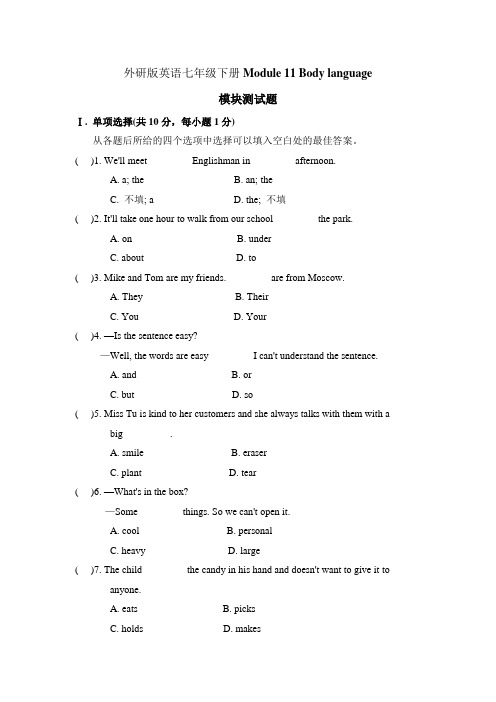
外研版英语七年级下册Module 11 Body language模块测试题Ⅰ. 单项选择(共10分,每小题1分)从各题后所给的四个选项中选择可以填入空白处的最佳答案。
( )1. We'll meet ________ Englishman in ________ afternoon.A. a; theB. an; theC. 不填; aD. the; 不填( )2. It'll take one hour to walk from our school ________ the park.A. onB. underC. aboutD. to( )3. Mike and Tom are my friends. ________ are from Moscow.A. TheyB. TheirC. YouD. Your( )4. —Is the sentence easy?—Well, the words are easy ________ I can't understand the sentence.A. andB. orC. butD. so( )5. Miss Tu is kind to her customers and she always talks with them with a big ________.A. smileB. eraserC. plantD. tear( )6. —What's in the box?—Some ________ things. So we can't open it.A. coolB. personalC. heavyD. large( )7. The child ________ the candy in his hand and doesn't want to give it to anyone.A. eatsB. picksC. holdsD. makes( )8. —Did you see an animal ________ around us?—Yes. It was my dog.A. moveB. to moveC. movedD. moves( )9. —________?—They played basketball.A. What were they likeB. Where were theyC. Where did they readD. What did they do( )10. —Close the window, please.—________.A. See youB. OKC. Thank youD. You're welcomeⅡ. 完形填空(共10分,每小题1分)先通读下面的短文,掌握其大意,然后从A、B、C、D四个选项中选择可以填入空白处的最佳答案。
外研七年级下册 Module 11 单元测评(含答案)
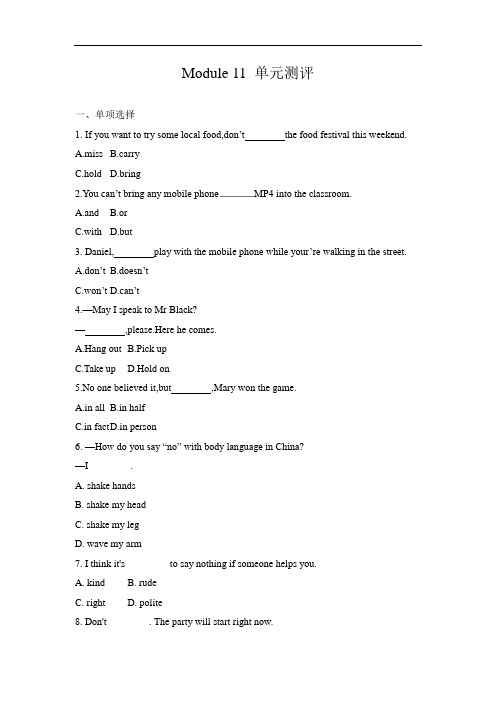
Module 11 单元测评一、单项选择1. If you want to try some local food,don’t the food festival this weekend.A.missB.carryC.holdD.bring2.You can’t bring any mobile phone MP4 into the classroom.A.andB.orC.withD.but3. Daniel,play with the mobile pho ne while your’re walking in the street.A.don’tB.doesn’tC.won’tD.can’t4.—May I speak to Mr Black?—,please.Here he comes.A.Hang outB.Pick upC.Take upD.Hold on5.No one believed it,but,Mary won the game.A.in allB.in halfC.in factD.in person6. —How do you say “no” with body language in China?—I ________.A. shake handsB. shake my headC. shake my legD. wave my arm7. I think it's ________ to say nothing if someone helps you.A. kindB. rudeC. rightD. polite8. Don't ________. The party will start right now.A. put awayB. take awayC. move awayD. wash away9. —Don't be late again, Mike!—________A. No, I don't.B. Don't worry.C. Sorry, I won't.D. I don't know.10. —What do Chinese people do when they meet new people?—They often ________ when they meet new people.A. point at each otherB. wave at each otherC. shake hands with each otherD. hug each other二、完形填空We use body language to send messages to others. It is very __1__ because others can understand you easily when you use body language. When you are talking with others, you are not just using __2__,but also using gestures(手势). For example, waving one's hand is to say “Good-bye”. Shaking hands means welcome, and clapping hands __3__ congratulations (祝贺). Nodding the head means YES, but shaking the head means NO.Different countries have __4__ body language. For example, when in __5__,France and Arab countries, people kiss each other when they meet,__6__ men in China or Australia shake hands. People in Puerto Rico like touching each other, but people in Britain do not touch each other. People in Arab countries like __7__ close to one another when they are talking, but English people must keep a distance away when they are talking. It is very important __8____ the meanings of gestures and movements in the foreign country __9__ they will help you communicate with people and make you stay there much more __10__ and comfortable.( )1. A. helpful B. difficult C. easy D. useless( )2. A. words B. bodies C. handshakes D. hands( )3. A. to mean B. mean C. means D. meaning( )4. A. the same B. a same C. the different D. different ( )5. A. Russia B. the Russia C. Russian D. a Russia( )6. A. and B. or C. but D. so( )7. A. stand B. stands C. sit D. standing( )8. A. knowing B. know C. to know D. knows( )9. A. when B. because C. so D. if( )10. A. important B. sad C. interesting D. pleased三、阅读理解In the USA,men usually shake hands when they meet,but it is quite unusual for men to kiss when they greet each other.Greetings are casual—a handshake,a smile and a “hello”will do just fine.The British often simply say “hello”when they meet friends.They usually shake hands only when they meet for the first time.Social kissing often just a peck (轻吻)on the cheek (脸颊),is common in an informal (非正式的)situation between men and women and also between women who know each other very well.In Japan,the common greeting for both men and women is to bow when they greet someone,instead of giving a handshake or a hug.Hungarians like to greet in a friendly way—kiss each other on both cheeks.The most common way is to kiss from your right to your left.When men meet for the first time,a handshake is the norm.In Albania,men shake hands when greeting one another.A kiss on the cheek may be also common if there is a close relationship.Women may shake hands or kiss each other on both cheeks.In Armenia,by tradition,a woman needs to wait for a man to offer his hand for a handshake.Between good friends and family members,a kiss on the cheek and a hug are also common.1.In Britain,when two people meet for the first time,they usually .A.hugB.bowC.shake handsD.kiss on the cheek2.Which of the following is TRUE according to the passage?A.In Japan,hugging is as common as bowing.B.In Hungary,people usually kiss each other on the cheeks from left to right.C.In Albania,it is unusual for men to kiss if there is a close relationship.D.In Armenia,it is necessary for a woman to wait for a man to offer his hand for a handshake.3.What’s the best title of the passage?A.Country and CultureB.Culture and PeopleC.Greeting Customs Around the WorldD.Body Language in Different Cultures四、根据句意及首字母或汉语提示写出单词1.People think red can b them good luck.2.Mary stood up quickly and s hands with her new classmates.3.The girl is from Tokyo and she can speak J .4.It was very cold. She (移动)her chair nearer to fire.5.Everyone (鞠躬)as the Queen walked into the room.五、任务型阅读When I was a boy, I didn't have any hair on my head. So I was very shy. I liked to watch my friends play in the park. Sometimes I would join them, but most of the time I just watched them play.Every day, we would see an old man walking in the park. He had big ears and no hair. We thought he was dumb (哑的). Every time when my friends saw him, they would say loudly, “Hey, Mr Dumb, what's the time?” But they got no answer or even any sign of body language.One early evening, I was standing outside my house, and I saw the old man coming. I was not with any of my friends and there were no other kids around to say the usual words of “greeting”.But how could I let the old man walk by without saying anything?So for the first time, I asked, “Hey, Mr Dumb, what's the time?”The old man looked at me. Then he looked at his watch and answered, “It's six thirty.”I ran into my house and never said that “greeting” to the old m an after that day.1. What did the writer look like when he was a boy?(不超过10个词)_____________________________________________________________2. Where did the boy himself meet the old man? (不超过15个词)______________________________________________________________3. From the last sentence how do you guess the boy may feel? (不超过15个词)_____________________________________________________________六、书面表达请你根据下面表格中的内容, 写一篇60词左右的文章介绍中国的一些习俗(customs)。
初中英语外研版七年级下册《Module 11》单元测试题 2

Module 11 单元测试题2Ⅰ. 单项选择(共10分,每小题1分)从各题后所给的四个选项中选择可以填入空白处的最佳答案。
( ) 1. —Where is your brother?—He’s studying ________ America. He’s coming back ________ July.A. at; inB. in; inC. in; atD. at; at( ) 2. Have a look at these apples. ________ are from the farm in my village.A. WeB. YouC. ItD. They( ) 3. —What do you think of our workers here?—They are kind ________ hard-working.A. andB. butC. soD. or( ) 4. —What are you going to do?—I’m meeting some ________ at the airport. They’re on holiday.A. bagsB. planesC. visitorsD. newspapers( ) 5. She decided to teach those students with long ________ to play the piano.A. legsB. facesC. fingersD. hair( ) 6. —Is he our ________ guide?—I’m not sure. But he can speak Russian well.A. ChineseB. EnglishC. RussianD. French( ) 7. —Why is he angry?—It’s ________ to enter his office without knocking on the door.A. rudeB. difficultC. interestingD. easy( ) 8. —Could you read those words for me?—Don’t ________ these things in the lab. It’s dangerous.A. writeB. watchC. drawD. touch( ) 9. ________ the new book with you tomorrow. We’ll learn a new lesson.A. BorrowB. BringC. BuyD. Open( ) 10. —________ do you answer a question in class?—Stand up and answer the question.A. WhyB. HowC. WhenD. WhereⅡ. 完形填空(共10分,每小题1分)先通读下面的短文,掌握其大意,然后从A、B、C、D四个选项中选择可以填入空白处的最佳答案。
2013年春外研英语七年级下册单元测试题(Module11)
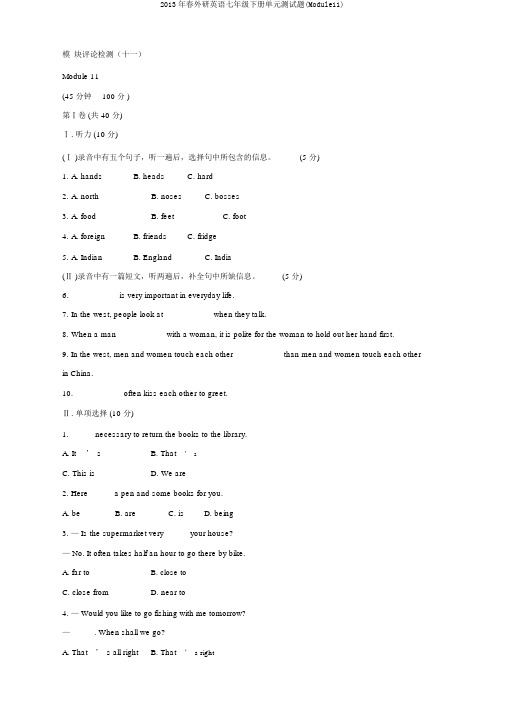
模块评论检测(十一)Module 11(45 分钟100 分 )第Ⅰ卷 (共 40 分)Ⅰ. 听力 (10 分)(Ⅰ )录音中有五个句子,听一遍后,选择句中所包含的信息。
(5 分)1.A. hands B. heads C. hard2.A. north B. noses C. bosses3.A. food B. feet C. foot4.A. foreign B. friends C. fridge5.A. Indian B. England C. India(Ⅱ )录音中有一篇短文,听两遍后,补全句中所缺信息。
(5 分)6._____ _____ is very important in everyday life.7.In the west, people look at _____ _____ when they talk.8.When a man _____ _____ with a woman, it is polite for the woman to hold out her hand first.9.In the west, men and women touch each other _____ _____ than men and women touch each other in China.10._____ _____ often kiss each other to greet.Ⅱ. 单项选择 (10 分)1. _____ necessary to return the books to the library.A. It’ sB. That’ sC. This isD. We are2. Here _____ a pen and some books for you.A. beB. areC. isD. being3. — Is the supermarket very _____ your house?— No. It often takes half an hour to go there by bike.A. far toB. close toC. close fromD. near to4. — Would you like to go fishing with me tomorrow?— _____. When shall we go?A. That’ s all rightB. That’ s rightC. RightD. All right5.(2012永·州中考 ) _____ get off the bus before it stops.A. Don ’tB. Doesn’tC. Didn ’t6.They entered the room _____.A. arm with armB. arm to armC. arm in armD. arm on arm7.My friend _____ the book with him when he came to see me.A. tookB. carriedC. broughtD. got8.One of you will stay here, and the others will _____.A. take awayB. move awayC. put awayD. give away9. — Do you know why he failed ( 失败 )?— I think that’s he is too careless.A. becauseB. whyC. soD. for10. (2012杭州·中考) Mom makes me eat an apple every day _____ the doctor away.A. keepsB. is keptC. to keepD. keptⅢ. 完形填空 (10 分)People use body language to send messages to others. It is very1because others can understand you easily when you use body language. When you are talking with others, you are not just using words,but also using2. For example, waving one ’hands is to say “ Good-bye ”Shaking. hands means wele, and clapping hands3congratulations( 庆祝 ). Nodding the head means YES, but shaking the head means NO.Different countries have4body languages. For example, when in5, France and Arab countries kiss each other when they meet,6men in China or Australia shake hands. People in Puerto Rico like touching each other, but people in Britain do not touch each other. People in Arab countries like7close to one another when they are talking, but English people must keep a distance away when they are talking. It is very important8the meanings of gestures and movements in the foreign country9they will help you municate with people and make you stay there much more10 and fortable.1. A. helpful B. difficult C. easy D. useless2. A. words B. gestures C. handshake D. hands3.A. to mean B. meanC. meansD. meaning4.A. the same B. a sameC. the differentD. different5.A. Russia B. the RussiaC. RussianD. a Russia6.A. and B. or C. but D. so7.A. stand B. standsC. sitD. standing8.A. knowing B. knowC. to knowD. knows9.A. when B. because C. so D. if10. A. important B. sadC. interestingD. pleasedⅣ. 阅读理解 (10 分)There are many TV programs on Chinese cuisine( 烹调 ) now. A Bite of Chinais a new program on diet ( 饮食 )culture and it’ s very popular. The CCTV ChannelOne show began to play on May 14th, 2012. It was held by award-winningdocumentary maker Chen Xiaoqing. The program tries to bring something new bypresenting more cultural elements related to dishes, such as eating habits and theethics(道德 )of eating. It also offers insights into the geographical, historical andcultural dimensions of what Chinese eat. It can teach us how to make the food. Sothe program is sure to attract both food buffs and ordinary audiences.A Bite of China has seven episodes(片段 ). Each episode lasts 50 minutes. Themes range from ingredients to preserved food.Food is always connected with people. To get enough good stories, the production team spent three months doing research and interviews in about 60 cities before they started shooting last July. Filming lasted about nine months.A Bite of China captures social changes while presenting food cultures, such as, many families leave old people in their hometowns while other members work outside, the food of their hometown can remind of happy times.Chen says the seven episodes might not be enough to capture the glory of Chinese food culture.1.A Bite of China is begun to play in _____, 2012.A. MarchB. MayC. JulyD. September2.There are_____ episodes in the new program.A. 12B. 50C. 7D. 603.To get enough good _____, the production team spent three months doing research.A. storiesB. culturalC. eating habitsD. the ethics of eating4.What ’ s the meaning of the underlined word“ presenting ” ?A.礼品B. 体现C.面对D. 播映5.A Bite of China is about _____.A. a TV programB. food cultureC. how to make foodD. social changes第Ⅱ卷 (共 60 分)Ⅴ. 词汇运用 (10 分)依据句意及首字母提示达成单词。
七年级英语(下)Module11测试题(外研社)(精)
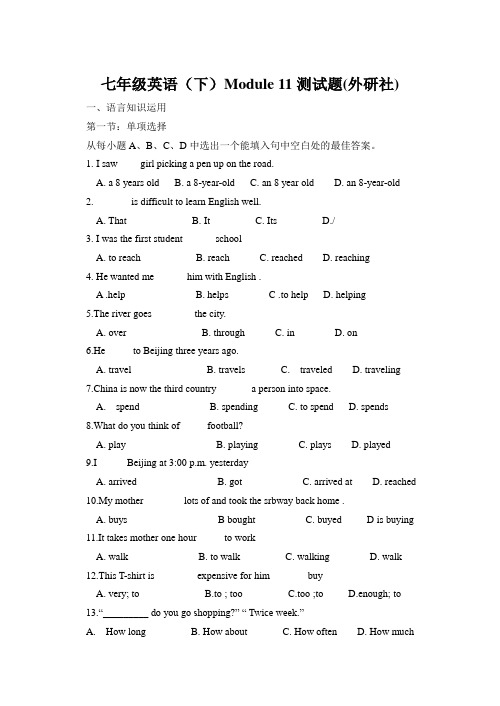
七年级英语(下)Module 11测试题(外研社) 一、语言知识运用第一节:单项选择从每小题A、B、C、D中选出一个能填入句中空白处的最佳答案。
1. I saw ____girl picking a pen up on the road.A. a 8 years oldB. a 8-year-oldC. an 8 year oldD. an 8-year-old2._______ is difficult to learn English well.A. ThatB. ItC. ItsD./3. I was the first student ______schoolA. to reachB. reachC. reachedD. reaching4. He wanted me______ him with English .A .help B. helps C .to help D. helping5.The river goes _____ the city.A. overB. throughC. inD. on6.He _____to Beijing three years ago.A. travelB. travelsC. traveledD. traveling7.China is now the third country ______ a person into space.A. spendB. spendingC. to spendD. spends8.What do you think of_____ football?A. playB. playingC. playsD. played9.I _____ Beijing at 3:00 p.m. yesterdayA. arrivedB. gotC. arrived atD. reached10.My mother _______ lots of and took the srbway back home .A. buys B bought C. buyed D is buying11.It takes mother one hour_____ to workA. walkB. to walkC. walkingD. walk12.This T-shirt is________ expensive for him_______ buyA. very; toB.to ; tooC.too ;toD.enough; to13.“_________ do you go shopping?” “ Twice week.”A. How longB. How aboutC. How oftenD. How much14. It is very interesting ______English.A. learnB. to learnC. learningD. learns15.______he went to the Great Wall with Ann.A. Next yearB. Next yearC. In 2007D. The next year第二节:完形填空(共10小题,每小题1分,计10分)阅读下面短文,从A、B、C、D中选出一个能填入短文中相应空白处的最佳答案。
- 1、下载文档前请自行甄别文档内容的完整性,平台不提供额外的编辑、内容补充、找答案等附加服务。
- 2、"仅部分预览"的文档,不可在线预览部分如存在完整性等问题,可反馈申请退款(可完整预览的文档不适用该条件!)。
- 3、如文档侵犯您的权益,请联系客服反馈,我们会尽快为您处理(人工客服工作时间:9:00-18:30)。
模块评价检测(十一)Module 11(45分钟100分)第Ⅰ卷(共40分)Ⅰ. 听力(10分)(Ⅰ)录音中有五个句子,听一遍后,选择句中所包含的信息。
(5分)1. A. hands B. heads C. hard2. A. north B. noses C. bosses3. A. food B. feet C. foot4. A. foreign B. friends C. fridge5. A. Indian B. England C. India(Ⅱ)录音中有一篇短文,听两遍后,补全句中所缺信息。
(5分)6. _____ _____ is very important in everyday life.7. In the west, people look at _____ _____ when they talk.8. When a man _____ _____ with a woman, it is polite for the woman to hold out her hand first.9. In the west, men and women touch each other _____ _____ than men and women touch each other in China.10. _____ _____ often kiss each other to greet.Ⅱ. 单项选择(10分)1. _____ necessary to return the books to the library.A. It’sB. That’sC. This isD. We are2. Here _____ a pen and some books for you.A. beB. areC. isD. being3. — Is the supermarket very _____ your house?— No. It often takes half an hour to go there by bike.A. far toB. close toC. close fromD. near to4. — Would you like to go fishing with me tomorrow?—_____. When shall we go?A. That’s all rightB. That’s rightC. RightD. All right5. (2012·永州中考) _____ get off the bus before it stops.A. Don’tB. Doesn’tC. Didn’t6. They entered the room _____.A. arm with armB. arm to armC. arm in armD. arm on arm7. My friend _____ the book with him when he came to see me.A. tookB. carriedC. broughtD. got8. One of you will stay here, and the others will _____.A. take awayB. move awayC. put awayD. give away9. — Do you know why he failed (失败)?—I think that’s _____ he is too careless.A. becauseB. whyC. soD. for10. (2012 ·杭州中考) Mom makes me eat an apple every day _____ the doctor away.A. keepsB. is keptC. to keepD. keptⅢ. 完形填空(10分)People use body language to send messages to others. It is very 1 because others can understand you easily when you use body language. When you are talking with others, you are not just using words, but also using 2 . For example, waving one’s hand is to say “Good-bye”. Shaking hands means wele, and clapping hands 3 congratulations(祝贺). Nodding the head means YES, but shaking the head means NO.Different countries have 4 body languages. For example, when in 5 , France and Arab countries kiss each other when they meet, 6 men in China or Australia shake hands. People in Puerto Rico like touching each other, but people in Britain do not touch each other. People in Arab countries like 7 close to one another when they are talking, but English people must keep a distance away when they are talking. It is very important 8 the meanings of gestures and movements in the foreign country 9 they will help you municate with people and make you stay there much more 10 and fortable.1. A. helpful B. difficult C. easy D. useless2. A. words B. gestures C. handshake D. hands3. A. to mean B. meanC. meansD. meaning4. A. the same B. a sameC. the differentD. different5. A. Russia B. the RussiaC. RussianD. a Russia6. A. and B. or C. but D. so7. A. stand B. standsC. sitD. standing8. A. knowing B. knowC. to knowD. knows9. A. when B. because C. so D. if10. A. important B. sadC. interestingD. pleasedⅣ. 阅读理解(10分)There are many TV programs on Chinese cuisine(烹饪) now. A Bite of Chinais a new program on diet (饮食)culture and it’s very popular. The CCTV ChannelOne show began to play on May 14th, 2012. It was held by award-winningdocumentary maker Chen Xiaoqing. The program tries to bring something new bypresenting more cultural elements related to dishes, such as eating habits and theethics(道德)of eating. It also offers insights into the geographical, historical andcultural dimensions of what Chinese eat. It can teach us how to make the food. Sothe program is sure to attract both food buffs and ordinary audiences.A Bite of China has seven episodes(片段). Each episode lasts 50 minutes. Themes range from ingredients to preserved food.Food is always connected with people. To get enough good stories, the production team spent three months doing research and interviews in about 60 cities before they started shooting last July. Filming lasted about nine months.A Bite of China captures social changes while presenting food cultures, such as, many families leave old people in their hometowns while other members work outside, the food of their hometown can remind of happy times.Chen says the seven episodes might not be enough to capture the glory of Chinese food culture.1. A Bite of China is begun to play in _____, 2012.A. MarchB. MayC. JulyD. September2. There are_____ episodes in the new program.A. 12B. 50C. 7D. 603. To get enough good _____, the production team spent three months doing research.A. storiesB. culturalC. eating habitsD. the ethics of eating4. What’s the meaning of the underlined word “presenting”?A. 礼物B. 呈现C. 面对D. 播映5. A Bite of China is about _____.A. a TV programB. food cultureC. how to make foodD. social changes第Ⅱ卷(共60分)Ⅴ. 词汇运用(10分)根据句意及首字母提示完成单词。
